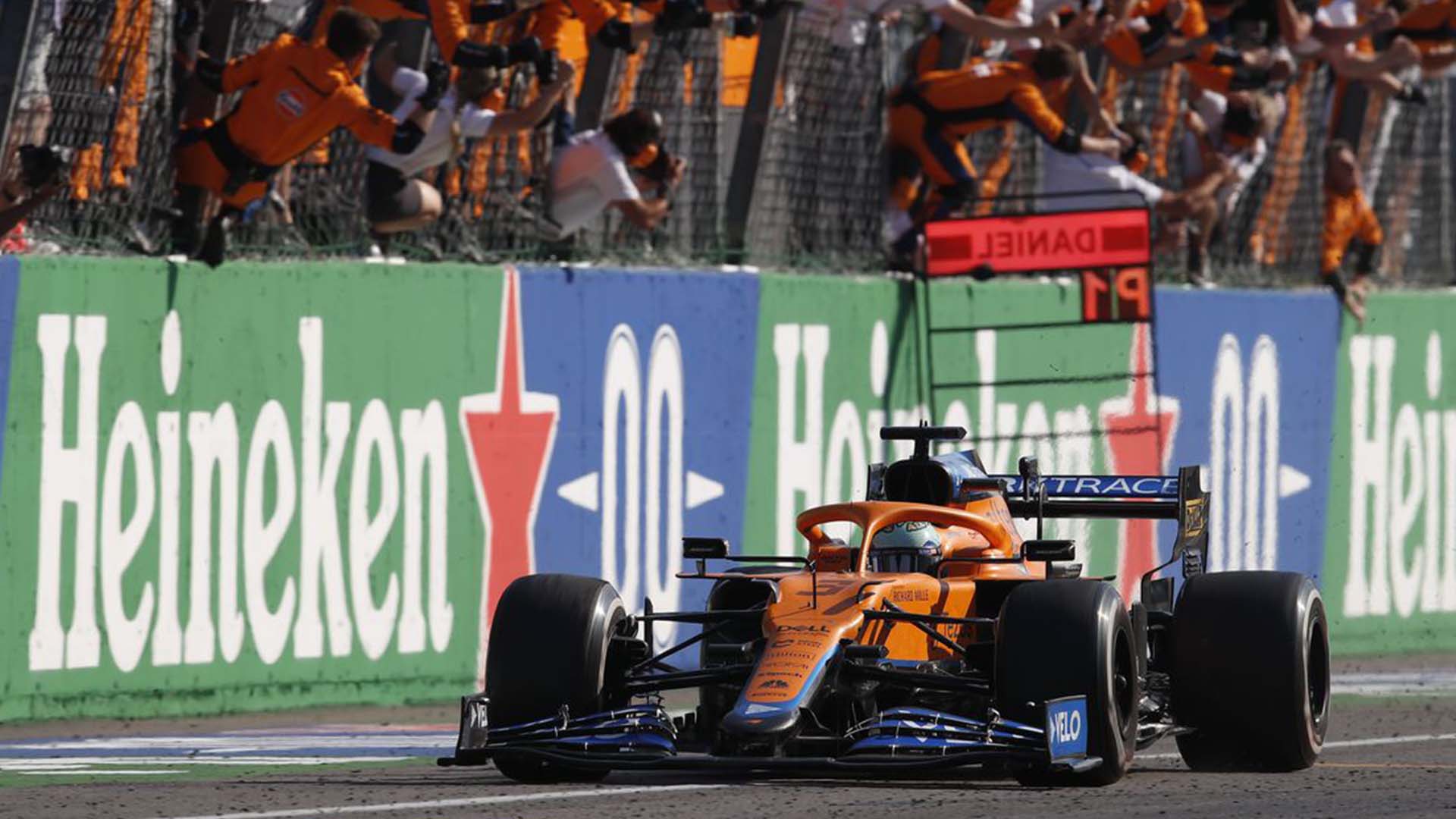

A Mercedes-powered team took a 1-2 finish in the Italian Grand Prix. Shocking, I know—if you’ve been following Formula One’s hybrid era whatsoever, then the idea of that happening really isn’t a surprise. Unless you know it wasn’t the factory team, it was McLaren. Yes, the same McLaren that’s Honda era was so laughably horrible it started feeling like weekly bullying to even force the outfit to take its cars out. 3,213 days after its last win, the papaya team is back on the top step of the podium.
McLaren’s fall from grace was only really matched by Williams’ and with the massive dominance of Mercedes, it had seemed sad and kind of unstoppable. Like a car with terminal brake failure, the wheels looked like they were going to come right off some of F1’s longest-standing privateer teams and possibly fly into a few other garages on their way out. F1’s like that, after all: brutal. When you’re on a downer and in such a technologically complicated era, it seemed impossible any team could scrap its way back. But McLaren seems to have done exactly that.

It’s been a really, really rough few years for McLaren. From the troubled departure of longstanding team boss Ron Dennis to incidents like Freddogate, when staff who’d worked hundreds of hours of overtime were rewarded with 35-cent chocolate bars. Since the arrival of CEO Zak Brown, the situation seems to have recovered a lot, particularly once its driver lineup changed at the start of 2019 and former Porsche LMP1 team principal Andreas Seidl arrived.
2017 was something of a nadir, the team only scoring 30 painful points over the season. It also happens to be when Lando Norris, who came second in the Italian Grand Prix, joined McLaren, so he actually predates the arrival of anyone else who stood on the podium on Sunday, a huge transformation having taken place over his time there.
Dark times in Woking haven’t been totally relegated to the 2010s, though. Earlier this year, McLaren had to sell its beloved Technology Centre to some dead-eyed capitalists in order to rent it back as part of a 2020 emergency refinancing. Before his win on Sunday, Daniel Ricciardo had been struggling to adapt to the car and he couldn’t offer explanations for his lack of pace after being lapped in Monaco by Norris.
The fact is McLaren hasn’t always been the third-best car on the grid this year. Yes, its monstrous straight-line speed means Monza was always going to be its best chance of a big result, but Mercedes and Red Bull had looked comfortably ahead during Friday’s “normal” qualifying. Ricciardo and Norris made the most of the sprint qualifying session—a new thing where instead of the thrill of qualifying, we get a short race no one cares about on a Saturday afternoon—to line up second and third but there was no guarantee they’d stay there.
Going from scrappily managing to net Norris a single point at the Dutch Grand Prix the previous weekend to Ricciardo sailing past Max Verstappen off the line and holding the lead, Norris fending off Lewis Hamilton behind them, is a huge transformation for a racing team whose reputation has undergone a massive makeover in the past three years but was seriously plummeting in recent memory.
It wasn’t only Hamilton and Verstappen crashing that handed McLaren the win. Ricciardo was on for it anyway and Norris was ahead of both the Mercedes and Red Bull after their pit stops. It needed teamwork, from Norris holding tight to not risk the result when he thought he was—and in fact, actually was at the time—faster than Ricciardo to the perfectly executed pit stops that Mercedes and Red Bull totally failed at. The kind of team effort that might not be replicable every weekend but shows the extent to which this isn’t a fluke result, it was McLaren getting it right where others didn’t.
It’s easy in F1 to forget Mercedes used to be a second-tier team, at least as far as results go. During the Red Bull era, everyone thought Lewis Hamilton was insane for moving there. Although there’s been very little change at the top over the last seven years, it’s been long enough for McLaren to drag itself to the depths of whatever hell an F1 team could imagine (it probably is Fernando Alonso getting lapped in your car every weekend, to be fair) and then crawl all the way back.
It’s interesting because McLaren was—and sometimes still is—one of the most traditional F1 teams. Now it has an esports room in the middle of its factory and looks well on track to refinancing anything it wants via selling fans irresistibly pastel merch for both drivers. All the stuff McLaren has embraced since it seemed to decide things couldn’t get any less dignified anyway seems to be helping it get back to the top, from getting nerdy to being the F1 team to most keenly embrace talking about mental health issues and the toll of the calendar on the team.
One victory doesn’t make it all straightforward for the rest of the season, obviously. The Russian Grand Prix might be an unmitigated disaster for McLaren and you’re only as good as your last performance but maybe, just maybe, even something as set in its ways (and grid positions) as F1 can change for the better.
Got a story tip? Mail tips@thedrive.com